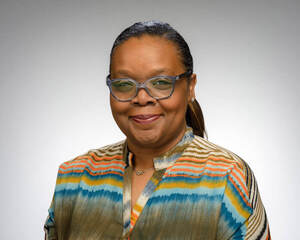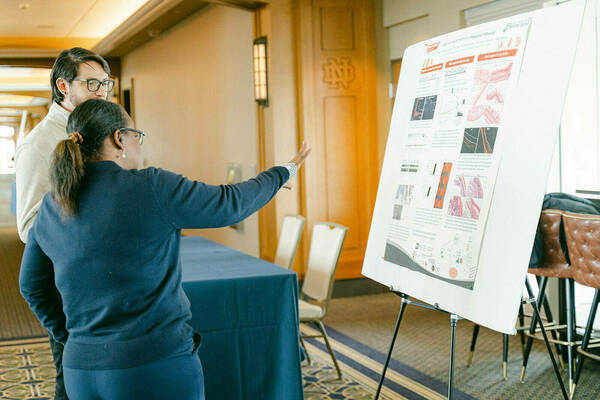This article is a part of the DEI Practitioner Spotlight series, featuring the work of professionals and experts across the University who are working to advance DEI initiatives within their home units and departments. If you have a story idea about a person or program, please email the Office of Institutional Transformation at transformation@nd.edu.

When Keona Lewis observes a problem or challenge, she is driven to work toward a solution. For Lewis, assistant provost for academic diversity and inclusion and assistant professor of the practice at the Center for Social Concerns, it’s part of her DNA as an applied anthropologist. In less than 18 months she has leveraged her expertise to develop insights and initiatives that can positively impact retention and recruitment for Notre Dame faculty from underrepresented racial or ethnic groups.
One challenge she learned of soon after arriving in South Bend is that students of color can complete four years of coursework on campus and never have a professor who looks like them. Despite the growing number of Notre Dame students from racial and ethnic minority groups, it can feel isolating when they have little to no interaction with academics who share cultural traditions or background and who can model a pathway to success in a given field. In the same way, it can be beneficial to a faculty member’s leadership development and wellbeing to share their wisdom and experience with students who are hoping to follow in their footsteps.
To bridge this gap, Lewis organized a welcome reception at the beginning of the 2023-2024 academic year for Black and Indigenous incoming students, faculty members, and allies. “This was an opportunity for faculty of color to come together and introduce themselves to students of color. It was an opportunity for faculty and students to see community, or a support system, and [the Office of the Provost] helped foster that,” she said.
The inaugural event was beneficial in quickly identifying potential resources and mentors for the students as well as providing an opportunity for fellowship and camaraderie-building among faculty colleagues and peers. A second reception is being planned for Fall 2024 that will also include all faculty of color and incoming students.
Lewis has also helped bring to life the Maintaining Linkages Initiative (MLI), which is designed to nurture relationships between Notre Dame faculty and alumni scholars who are pursuing doctoral degrees or have academic appointments at other institutions. Alumni scholars gain exposure to more experienced faculty who can help guide their growth as well as awareness of milestones in Notre Dame academic units aligned with their disciplines. In addition, there’s an increased likelihood of alumni scholar-faculty interaction via panel discussions, conference participation, and collaborative research.
“We have to recruit and retain diverse faculty, but getting faculty into the pipeline is a challenge,” Lewis said. MLI is one way for Notre Dame to stay apprised of the alumni scholars’ academic or creative endeavors and, where appropriate, consider their inclusion in candidate pools as faculty positions become available.
Our Futures Weekend and challenging hiring bias

In February of this year, the Provost’s Office partnered with the Graduate School, Notre Dame Research, and the Office of Institutional Transformation to host Our Futures Weekend. Ten MLI alumni scholars and nearly 50 undergraduates from Historically Black Colleges and Universities and Hispanic-Serving Institutions were invited to campus to learn more about Notre Dame, share their research with faculty, and better understand where the University is headed during the next decade.
“Our goal for the Our Futures Weekend was to provide a first-class educational and recruitment experience for future faculty and prospective graduate students from underrepresented backgrounds in the academy,” said Lewis. “Feedback from participants showed we were able to accomplish that goal. The participants overwhelmingly agreed that they felt welcomed and a sense of belonging at Notre Dame. They also overwhelmingly agreed they believed Notre Dame would be a place where they could thrive. That description is the Notre Dame we aspire to be, and the Our Futures Weekend proved we can achieve that goal.”
She’s also working with various stakeholders to examine the hiring process from start to finish, with an eye toward avoiding subjective decision-making along the way that may be based on preference or bias. “Whether it’s socioeconomics, race, gender, sexual orientation, or something else, most of us have less interaction with people who aren’t like us,” she said. “This can create a bias where, at the base level, people who are considered ‘outsiders’ are unintentionally excluded from being a part of something.”
Examples of preference or bias during the hiring process include superficially limiting the places to advertise for a position, depending too heavily on existing colleague networks for recruits, valuing published research that appears in one academic journal over another when there’s no objective difference between the two, veering away from position-related questions in an interview because of a shared interest or affiliation with a candidate, or making assumptions about a candidate’s skills (or lack thereof) based on their actual or assumed age.
“We are providing strategies and tools to mitigate bias and make the process more equitable and inclusive,” said Lewis. And once new faculty are here, she noted, “we have to offer opportunities for development along with a transparent and clear path toward tenure. The path is here, and it’s up to us to provide the access, resources, and support that new faculty need to successfully navigate it.”
Building on a solid foundation
Lewis was at Georgia Institute of Technology when she learned of Notre Dame’s search for someone to guide the academic diversity and inclusion strategy. At the time, she was associate director of research and evaluation for diversity, equity and inclusion. And she was pleased with the progress she was making in developing, supporting and evaluating programs for faculty, staff, and students.
One of her most meaningful experiences was ensuring that Georgia Tech’s Kendeda Building for Innovative Sustainable Design was an education, research, and outreach space that was welcoming and accessible for all Georgia Tech students. During the planning phase for the facility, Lewis created an equity champions program to capture the needs and perspectives of a broader sample of stakeholders. “We brought in 10 students — undergrads and graduate students — who were diverse by major, abilities, ethnicities, and sexual orientation. It was fulfilling to bring those voices into a space where there was hardly any diversity initially. The students became ambassadors for the building and the work.”
Lewis fully intended to continue with similar efforts at Georgia Tech until the Notre Dame opportunity presented itself. “I didn’t know much about Notre Dame,” the Florida native admits, “but I was intrigued at being able to focus on one group as opposed to being spread across everything that is being done. It seemed like an opportunity to really gauge the type of impact we can have.”
And while her impact is already being felt, Lewis attributes any success to those who have done the work before her. Pamela Nolan Young was hired as director for academic diversity and inclusion in 2016. Her work included expanding education and awareness for faculty as well as providing leadership to colleges and departments on implementation of diversity and inclusion initiatives. After Young left the University, Maura Ryan, vice president and associate provost for faculty affairs, oversaw the academic diversity and inclusion strategy.
“The world is changing, and our student and faculty demographics are changing. What we give them has to answer that call.”—Keona Lewis
“I’m coming in at the best time. I see what they did as foundational, and I’m hoping to take that work and build on it,” Lewis said. “We’re at a place now where we understand a lot of the issues and the history. Now, it’s ‘How do we take all of this information and build the community we aspire to?’ We aspire to be a place where all faculty, staff, and students feel welcome, a sense of belonging, and believe that Notre Dame is a place where they are empowered to thrive and flourish.”
That said, Lewis isn’t content to try to solve tomorrow’s challenges with today’s knowledge set. “I’m still learning DEI because the world is changing, and our student and faculty demographics are changing. What we give them has to answer that call,” she pointed out. Her work includes data and evaluation, which appeals to Lewis’ analytical side; but it also allows her to engage deeply with the Notre Dame community, which feeds her spirit.
“I’m a pragmatist, although I don’t like to do things that I don’t feel connected to or passionate about. I’m heart-led,” she said. “One of the reasons I chose to come to Notre Dame was because of its ability to speak to the heart and the mind. DEI is heart work, but also mind work. To do this work at a place that lifts both up is rare, unique, and really special.”
Originally published by at transformation.nd.edu on June 28, 2024.